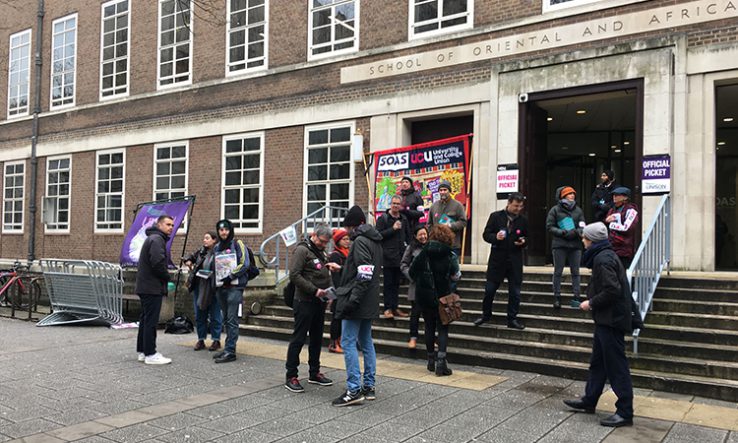
Image: Fiona McIntyre for Research Professional News
Michael Hastings urges higher education managers and unions to swap strikes for a social pact
All social struggles have to be conducted within ethical parameters. These may differ from context to context and from sector to sector, but a concern with ethics has to be a defining feature of all such struggles, including collective industrial action. What then is the ethical parameter of a strike in a university?
The University and College Union and Unison have intensified their pay and pensions dispute with 18 days of strikes, and a pending assessment and marking boycott. Eighteen days of strike action will constitute more than 50 per cent of the teaching days in February and March—the last two months of this critical term of the academic year. Both will significantly affect student learning and progression. For some students, this disruption will be on top of the impact of the pandemic on face-to-face teaching and the overall learning experience.
Public institutions
Perhaps the first defining element of the ethical parameters in which universities operate is the fact that many of them are public; they are institutions that do not appropriate a surplus for private shareholders. The second defining element is the fact that they primarily service students and their learning and professional development. Both of these features must influence the conduct of unions and how they engage in industrial relations disputes.
Union leaders in universities should recognise that one cannot conduct oneself in the same manner as in disputes in private companies. The actions of academics and professional services staff at a university must never irreparably threaten the learning and progression of students. But 18 days of strike action and an assessment and marking boycott essentially do this. Both actions compromise the ultimate outcome of the academic year: students’ graduation or progression. In effect, they represent breaches of the institutional mandate of a university and violate the essential principle of academic integrity.
Strategic failure
Beyond principle (on which people may hold different views), from the perspective of the unions these actions are not strategic. Industrial action will not result in the outcomes they seek.
Take the example of Soas University of London, which has already communicated its unhappiness with the pension reforms to Universities UK (UUK). Our director, Adam Habib, has publicly argued that the decision of the Universities Superannuation Scheme trustees was not sensible given that the asset and liability assessments had been undertaken in the midst of a pandemic. This has been shared with the unions and our internal community on multiple occasions.
Industrial action at Soas will not change the outcome of decisions on the pension benefits because these were made by USS trustees, who are not at the receiving end of the action. This is especially the case when industrial action is dispersed and disaggregated, with significant participation in a few places and sparse turnouts in most institutions in the country. In these circumstances, industrial action at Soas will only hurt our students and damage our institution, without contributing to any of the systemic positive outcomes desired.
Retrenchment threat
Such action will also have an impact on staff. Significant increases in remuneration would increase institutional expenditure that needs to be met by increased income. As a socially just institution, Soas does not carry large financial reserves from which to pay for significant wage increases. Many other universities in the sector are in the same position. In the context of a freeze on fee increases—in real terms a reduction due to high inflation—much of the increased income needed would have to come from increases in student numbers.
Student numbers will only increase if prospective students perceive that the university is prioritising their interests. If this is not the case, as 18 days of strike action is likely to suggest, students will not come, income targets will not be achieved, and the resulting financial deficits will force institutions to consider staffing reductions. The net effect of imprudent industrial action and unaffordable salary increases may very well be the retrenchment of staff costs and shrinkage in all areas of academic activity—an outcome that no stakeholder in a university wants.
Scrutiny needed
It is sometimes said that it is not for others to influence the particular type of industrial action adopted by unions. This is nonsense. Universities are meant to subject ideas, behaviour and strategies to critical scrutiny. This should apply to union leadership decisions as much as it applies to university executive decisions. None among us should be spared. If we truly believe in the legitimacy of our actions, we must be willing to subject them to robust debate and defend them in the contest of ideas.
A social pact urgently needs to be built between universities and their unions. Such a social pact does not mean capitulating to the demands of unions or being forced to acquiesce to university executives. Rather it recognises that the policy architecture and business model of a university is determined by actors outside of the higher education sphere.
A fight between internal stakeholders within universities serves no one. Indeed, it financially imperils institutions, compromises the learning of their students and threatens the livelihoods of their staff. It is thus imperative that unions and vice-chancellors in the sector get together to identify necessary actions and reforms that become the basis of their joint advocacy to government. This is the only rational and, frankly, progressive approach to the challenges confronting higher education in the UK. It is a thought that needs to be pondered by both the leadership of UUK and the unions themselves.
Michael Hastings is chair of the Soas board of trustees and a member of the House of Lords
